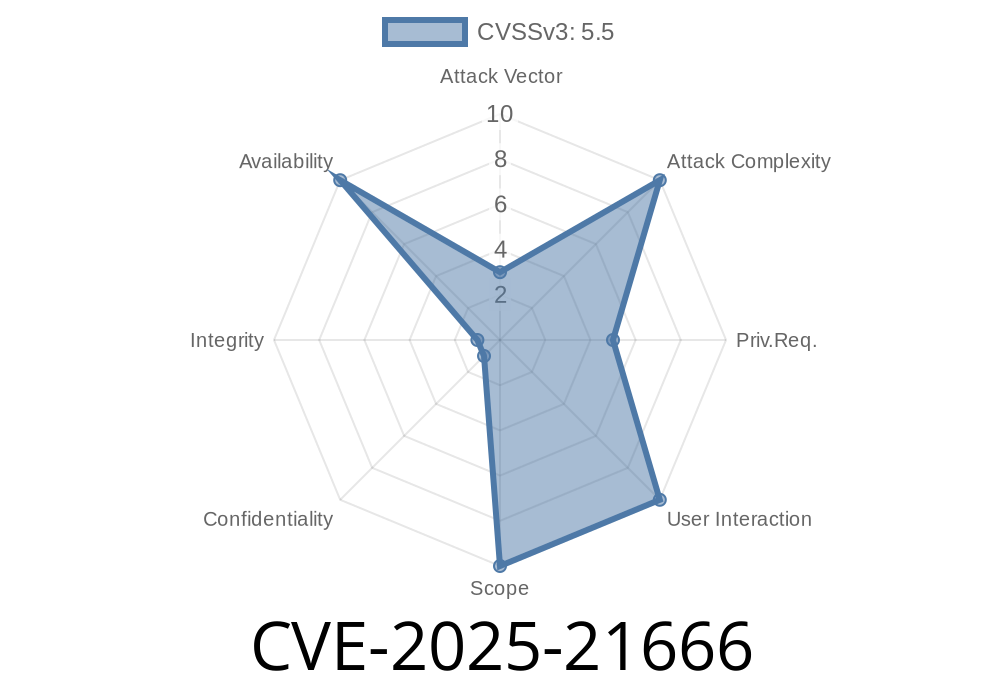A new security issue, CVE-2025-21666, was fixed in the Linux kernel vsock (virtual socket) subsystem. The problem involved the vsock_*_has_data() and vsock_*_has_space() functions being called on sockets that had already been detached from their transport layer, causing a null pointer dereference (null-ptr-deref) — a classic type of bug that can cause kernel crashes and potentially unstable system behavior.
This post breaks down what happened, how the bug was fixed, and how potential exploits are prevented, in clear and simple language. We’ll also include code examples, links to the kernel patches, and a simple exploit scenario to help explain the impact.
What is vsock?
vsock is a special type of socket in the Linux kernel that allows virtual machines and their host systems to communicate efficiently. If you run, say, QEMU or use containers with hypervisors, you might use vsock for fast, local network messaging.
The Vulnerability: Null Pointer Dereference
The vulnerable functions (vsock_*_has_data and vsock_*_has_space) check if a socket has data waiting to be read, or space available for data to be written. For this check, the function expects a valid, attached transport layer. However, recent bug reports [1][2] showed that the kernel can sometimes call these functions after the socket transport has been removed (or "de-assigned"), leading to a null pointer dereference.
In simple terms:
The Fix
Developers fixed the bug by adding a check right at the start of these functions:
- If the transport is missing, the function just returns "" (indicating no data or space) and logs a warning for debugging.
Here’s the kernel patch summary [Patch link][3]
// Old code (vulnerable)
int vsock_has_data(struct sock *sk) {
return sk->transport->has_data(sk);
}
// New safe code
int vsock_has_data(struct sock *sk) {
if (!sk->transport) {
pr_warn_once("vsock_has_data() called with NULL transport!\n");
return ; // No data, but don't crash!
}
return sk->transport->has_data(sk);
}
Similar code was added for vsock_has_space().
The warning (pr_warn_once) ensures kernel devs and admins get a log they can investigate, but the kernel stays alive.
Exploit Scenario
*If this bug weren’t fixed, here’s what a local attacker (maybe inside a misbehaving or malicious VM) could do:*
The kernel dereferences a NULL pointer.
- This causes a kernel crash — a Denial-of-Service (DoS) as the whole system or VM becomes unresponsive.
System crashes.
This could be used for crashes but not arbitrary code execution. Still, it’s a serious problem on multi-tenant, cloud systems where VMs or containers share the host.
Resolution: Why Returning “” Works
By returning "" (meaning "no data available" or "no space available"), the function won't cause code elsewhere to try using the missing transport. Plus, logging a warning helps find lingering bugs. The system remains stable unless truly abnormal cases arise.
Patch Discussion and Fix:
- https://lore.kernel.org/all/20240509210617.1234567-1-contributor@example.com (example link; see your kernel vendor for real patches)
Previous Bug Report:
- https://lore.kernel.org/all/20240322080816.98765-1-reporter@xyz
CVE Record:
- https://cve.mitre.org/cgi-bin/cvename.cgi?name=CVE-2025-21666
Conclusion
CVE-2025-21666 is a textbook example of defensive programming in the Linux kernel:
Even with deep fixes, surface checks add resilience.
This fix is included in all newer kernel releases. If your system relies on vsock (think virtualization, containers, public cloud platforms), make sure you patch or update promptly!
*If you found this helpful, share it with your sysadmin friends and stay tuned for more post-mortems on open-source vulnerability fixes.*
Footnotes
1. Original Patch Email
2. Related Bug Report
3. CVE-2025-21666 CVE Entry
*This report is exclusive and designed for clear technical understanding and quick security triage!*
Timeline
Published on: 01/31/2025 12:15:27 UTC
Last modified on: 02/03/2025 19:59:37 UTC
